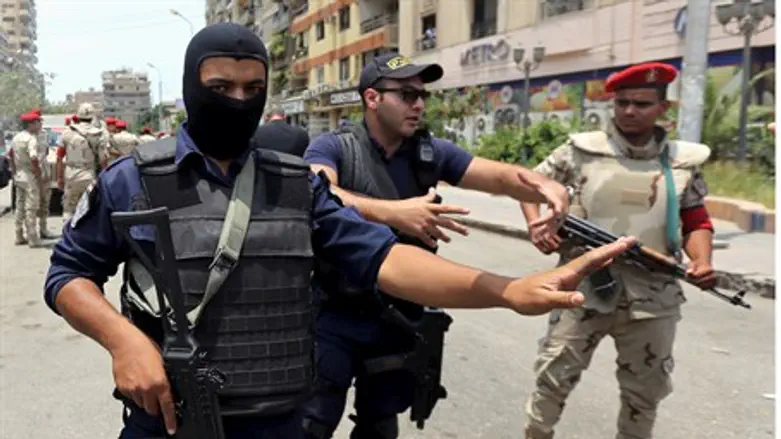
ISIS's escalating campaign against the Egyptian government - culminating in the assassination of the country's chief prosecutor and yesterday's bloody attacks in the Sinai Peninsula - have raised a great deal of questions vis-a-vis the extent and nature of the jihadist group's presence in the Arab world's most populous country.
Is ISIS's Egyptian branch - the so-called "Sinai Province" of its "Islamic State" - cooperating with Hamas, or trying to overthrow it? How has ISIS in Sinai managed to withstand a prolonged military assault by the Egyptian army to emerge apparently as strong as ever? How much of a threat does it pose to Israel? Could ISIS really be in a position to carve out a de-facto state in Egypt, as it has in parts of neighboring Libya?
In answering these questions Professor Efraim Inbar, Director of the Begin-Sadat Center For Strategic Studies (BESA), cautions that ISIS's battle with Egypt is far more complicated than its operations in other countries.
For a start, the Egyptian army and government present a far tougher foe than any other targeted directly by an official ISIS affiliate.
"It's all very well taking over parts of Syria or Iraq," both failed states without effective central government, "but in Egypt they are fighting against a functioning state," albeit a somewhat embattled one.
In Libya too, where ISIS has set up a mini statelet, the jihadists are operating amid a total power vacuum, in a country split among numerous warring militias.
To do the same in Egypt - even in the relatively lawless Sinai Peninsula - would be far more difficult, Inbar asserts.
"Egypt is determined to enforce its sovereignty over the Sinai," says Inbar.
However, Egypt is hamstrung by a number of factors, which have enabled ISIS to withstand and even push back against army offensives.
Firstly, there is the fact that Egypt's ability to deploy in the Sinai Peninsula is somewhat limited by the terms of its peace treaty with Israel, which prevents any large-scale deployments without prior consent from Jerusalem.
In practice, however, this has not been much of an issue. The close cooperation and clear mutual interest shared by the two countries in dealing with the jihadist threat has meant that Israel is giving the green light to any Egyptian army offensives or airstrikes against jihadists in the Sinai.
More significantly then is the fact that in a general sense, the Egyptian central government simply has not invested enough - militarily, economically or administratively - in what is essentially a peripheral province, at a time when it is still consolidating its control over the rest of the country.
Somewhat paradoxically, another factor which counts in ISIS's favor in Egypt is its very inability to overthrow the central government. That reality has forced it to pursue more limited, low-cost objectives: perpetuating and expanding the state of lawlessness, and its own foothold, in Sinai, while continuing to carry out individual, high-profile terrorist attacks.
This means that, relatively-speaking, "Daesh (ISIS) operations in Sinai are not an expensive effort," says Inbar, using the Arabic acronym for ISIS. Moreover, the fact that "ISIS Sinai Province" - formerly the Ansar Bayt al-Maqdis terror group - is an official "Wilayat" or "Province" of the so-called Islamic State, means it has at least some access to the swollen coffers of the world's richest terrorist group to fund the costs it does incur.
Finally, the group - both in its current incarnation and previous ones - "has been smuggling weapons for years," giving it time to build up an extensive arsenal.
But Inbar also speculates that other regional actors could be helping to fuel the ISIS insurgency in Egypt to further their own agendas.
He points to evidence of cooperation between ISIS and Hamas, which is itself at odds with the Sisi regime - though he acknowledges that with the inroads made by ISIS in Gaza this cooperation may well have broken down, as the Hamas regime now sees ISIS as a threat to its own power.
"There is some kind of sense of Islamic brotherhood - but at the same time remember they are competitors," both strategically and ideologically, says Inbar, explaining the complicated relationship between the two Islamist groups.
For a start, "Hamas is more of a nationalist-Islamic radical group, whereas ISIS is transnational."
But beyond the alleged Hamas connection - highlighted by both Israel and Egypt, even as Hamas denies such links exist - Inbar also suggests another of Cairo's regional foes may be playing a role behind the scenes.
"I wouldn't be surprised if there is Turkish input in trying to destabilize the Sisi regime," Inbar posits, pointing to the evidence of Turkish collusion and possibly even support for ISIS in Syria and Iraq, where Ankara has seen the jihadists as a convenient tool to block Kurdish autonomy.
Turkey's Islamist government - which has strong links to the Muslim Brotherhood and Hamas - similarly has an interest in weakening the anti-Islamist military government in Cairo.
So how should Israel deal with an ISIS presence along its southern border?
Cautiously, and with restraint, says Inbar.
Despite being the only ISIS affiliate bordering Israel, "Sinai Province" has had its hands full fighting the Egyptian army, and has not carried out any major attacks against Israel in the past few years.
Close cooperation between Israel and Egypt to contain ISIS means that situation is likely to continue, he says.
"Certainly it is a threat for Israel, but it's much more of a threat for Egypt and the Egyptian army right now."
For that reason, while Israel cannot afford to sit on its laurels, it must also continue to allow Egypt to play the lead roll.
"There is a great deal of cooperation to contain Daesh - they are trying and we are trying to prevent it (from attacking us).
"But everything Israel does should be coordinated with Egypt. Sometimes it's better to stay on the sidelines."
